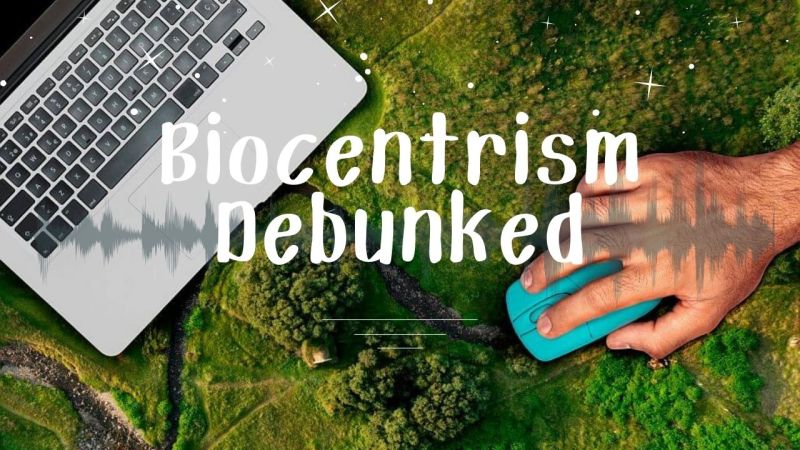Biocentrism Debunked Uncovering the Pseudoscience Behind This Controversial Theory

Have you ever pondered the mysteries of the universe and your place within it? Biocentrism, a controversial theory that challenges our understanding of reality, offers a unique perspective on consciousness and existence. In this blog post, we will delve into the depths of biocentrism to uncover the pseudoscience behind this intriguing concept. Join us on a journey to separate fact from fiction and explore why skepticism is key when navigating the realm of biocentrism debunked.
What is Biocentrism?
At its core, Biocentrism Debunked is a theory that places living organisms at the center of the universe’s existence. Unlike traditional scientific views that emphasize an external, material reality, biocentrism suggests that life and consciousness create the very fabric of our perceived world. According to this theory, our subjective experiences shape reality, leading to a profound interconnectedness between all living beings and the cosmos. Biocentrism challenges conventional notions of time and space by proposing that they are constructs of our minds rather than fundamental aspects of the universe. By exploring the relationship between consciousness and physical reality, biocentrism seeks to redefine how we understand our place in the grand scheme of existence.
The Key Principles of Biocentrism Debunked
Biocentrism Debunked is a theory that suggests life and biology are central to the universe’s existence. According to biocentrism, consciousness plays a fundamental role in shaping reality. This perspective challenges traditional views prioritizing physical matter as the foundation of everything.
One key principle of Biocentrism Debunked is the idea that our perception creates our reality. In other words, what we experience is shaped by our consciousness. This implies that the universe exists because we perceive it rather than existing independently of us.
Another important aspect of biocentrism is the concept of time as a human construct. Biocentrism proposes that time is not an external entity but a tool our minds use to make sense of events.
The key principles of biocentrism shift focus from material objects to consciousness as the driving force behind reality’s existence.
The Criticisms and Controversies Surrounding Biocentrism
Biocentrism, focusing on consciousness shaping reality, has sparked intense debates within the scientific community. One of the main criticisms revolves around the lack of empirical evidence to support its claims. Many argue that while intriguing, Biocentrism Debunked lacks the concrete scientific foundation needed to be considered a legitimate theory.
Another point of contention is the anthropocentric bias inherent in Biocentrism Debunked. Critics assert that placing humans and other living organisms at the center of the universe may be an oversimplification of complex cosmic processes. This perspective raises questions about objectivity and impartiality in scientific inquiry.
Furthermore, some scientists challenge Biocentrism Debunked dismissal of traditional physical laws and principles as mere products of human perception. The idea that our consciousness alone dictates reality contradicts established scientific frameworks, leading to skepticism among many experts in various fields.
These criticisms and controversies highlight the need for rigorous examination and scrutiny regarding theories like biocentrism that push boundaries at the intersection of science and philosophy.
Scientific Evidence Against Biocentrism
Biocentrism, a theory that suggests the universe is created by consciousness, has faced significant scrutiny from the scientific community. Despite its captivating premise, biocentrism lacks substantial empirical evidence to support its claims. The fundamental principles of biocentrism often contradict well-established scientific theories such as quantum mechanics and general relativity.
Critics argue that biocentrism fails to provide testable hypotheses or predictive power, which is essential to any credible scientific theory. Additionally, the concept of consciousness creating reality goes against the principles of causality and natural laws that govern our physical world.
Moreover, experiments in quantum physics have shown no direct link between observation and creation at a macroscopic level, as proposed by biocentrism. The lack of experimental validation undermines the credibility of this controversial theory in the eyes of many scientists.
Despite these criticisms and the absence of solid empirical evidence supporting biocentrism’s claims, it remains a highly debated topic in scientific and philosophical circles.
Alternative Theories About the Universe and Consciousness
One intriguing alternative theory about the universe and consciousness is panpsychism. This concept suggests that consciousness is a fundamental aspect of the universe, existing even at the level of particles and atoms. In essence, everything possesses some form of consciousness.
Another perspective that is gaining attention is the quantum mind theory. These propose that consciousness arises from quantum processes within the brain, suggesting a connection between quantum physics and our subjective experience.
Simulation theory offers a different take, positing that reality as we perceive it might be a sophisticated simulation created by advanced beings or technology. This idea challenges traditional notions of what constitutes reality and raises profound questions about our existence.
Some thinkers explore holographic theories, suggesting that the universe operates like a giant hologram where information is encoded in two dimensions but perceived as three-dimensional reality. This concept challenges our understanding of space and time.
These alternative theories invite us to reconsider our perceptions of reality and consciousness, pushing boundaries in scientific exploration.
Let’s continue exploring these fascinating ideas!
The Impact of Biocentrism on Society and Ethics
Biocentrism Debunked, focusing on the interconnectedness of all living things, has sparked discussions about how we perceive our place in the universe. This controversial theory challenges traditional views on consciousness and reality, leading to debates about the implications for society and ethics.
One potential impact of Biocentrism Debunked is a shift towards more environmentally conscious behavior. If everything in the universe is connected and holds intrinsic value, there may be an increased sense of responsibility for preserving ecosystems and biodiversity.
On the flip side, some critics argue that too much emphasis on human consciousness could lead to ethical dilemmas regarding other life forms. Questions arise about prioritizing different species and ecosystems if all are considered equally significant in a Biocentrism Debunked framework.
The impact of biocentrism on society and ethics remains complex and multifaceted as it continues to challenge conventional beliefs and raise important questions about our relationship with the natural world.
Conclusion: Why We Should Be Skeptical of Biocentrism
As we delve deeper into Biocentrism Debunked, it becomes apparent that while the theory may offer a provocative perspective on consciousness and the universe, there are significant criticisms and controversies surrounding its scientific validity. The lack of empirical evidence and the failure to withstand rigorous scientific scrutiny highlights the need for skepticism when considering biocentrism.
While exploring alternative theories about the nature of reality and consciousness is essential, it is equally important to approach these ideas with a critical eye. We can ensure that our understanding of the universe is grounded in sound science rather than speculative conjecture by remaining skeptical of claims that cannot be substantiated through empirical research or logical reasoning.
Fostering a culture of critical thinking and scientific inquiry is crucial in a world where misinformation can easily spread. By discerning information consumers and holding theories like Biocentrism Debunked to high standards of evidence, we can navigate complex philosophical discussions with clarity and intellectual rigor. Maintaining a healthy dose of skepticism towards extraordinary claims will help us separate fact from fiction in our quest for knowledge about the mysteries of existence.





